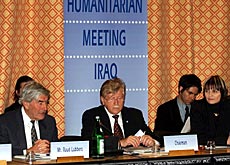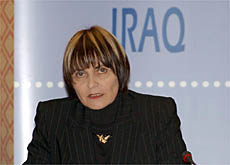Swiss declare Iraq conference a success

Switzerland says a humanitarian meeting on Iraq provided a successful platform for a "frank and open exchange of views".
Officials added though that funding for assistance projects remains scarce.
The meeting, which ended on Sunday in Geneva, brought together 21 aid agencies and 29 countries to discuss humanitarian assistance to Iraq in the event of war.
The Iraqis themselves were not invited, while the United States, who is spearheading war preparations declined to attend, saying it saw no purpose to the conference.
When the new Swiss foreign minister, Micheline Calmy-Rey, first proposed the meeting, it was greeted with scepticism. Aid agencies have been preparing for war in Iraq for some time now, and many echoed American doubts about the usefulness of further discussions.
But at the close of the meeting, Calmy-Rey claimed the two days had been helpful in bringing together aid agencies and countries that had so far not liased with one another.
“It’s the first time all these people have come together,” she told swissinfo, “the aid agencies, the countries that border Iraq and the donor countries.”
“I think Switzerland was the right nation to organise such an event. We are neutral and not implicated in any way.”
Money still lacking
Walter Fust, head of the Swiss Agency for Development and Cooperation (SDC), who chaired the meeting, said it was conducted in a “very transparent manner” but he added that funds that had been promised for Iraq must now be released.
“On paper a lot of preparation has been done,” Fust told swissinfo. “But in reality it is not so, because the funds are not available, or because countries will only release money in case of war.”
“That is not enough, because we need the money now.”
One problem is that many countries – and even the bigger aid agencies – do not want to be seen preparing for a war that they still hope will not take place.
For this reason, many United Nations organisations have been cloaking their plans for assistance to Iraq in secrecy.
Eric Hoskins, of the non-governmental organisation War Child, was one of the first Western doctors to enter Iraq after the first Gulf conflict in 1991. He is relieved the Geneva meeting succeeded in discussing the whole issue of assistance more openly.
“There’s been such a high level of secrecy surrounding contingency plans as if its such a bad thing,” he said. “I think this meeting succeeded in giving everyone around the table the feeling we need to discuss these things publicly.”
Hoskins added the meeting’s participants had agreed to a plan. “Now it’s time to press the button and implement it,” he told swissinfo.
Environmental concerns
As well as sharing views and information about existing contingency plans for Iraq, the meeting also came up with a concrete proposal from Switzerland to have a team of specialists standing by to assess environmental damage during a possible war.
There is particular concern that, as during the last Gulf War, oil fields might be set alight, or that even biological or chemical weapons could be used.
SDC director Fust also wants to set up a body to take a closer look at funding, where there are gaps for example, and how money can be more quickly allocated.
Later this week, UN agencies are expected to launch an appeal for funding for humanitarian assistance to Iraq in the event of war.
If the Geneva meeting achieved anything, it will have been to remind the world, and above all, donor countries, that preparations for war must also include preparations to help the populations caught up in the conflict.
swissinfo, Imogen Foulkes
29 countries and 21 aid organisations attended the meeting.
Iraq was not invited, and the United States declined to participate.
The two day meeting was led by the Swiss Agency for Cooperation and Development
Switzerland has provided almost SFr5 million worth of aid a year to Iraq since the 1991 Gulf War.
An overwhelming majority of Swiss are against war against Iraq, according to a poll carried out by the Swiss Broadcasting Corporation.
Nearly 88 per cent of those polled said they were against war.
Just 5.4 per cent of the 930 respondents said they supported military action, while 6.6 per cent had no opinion.
The poll showed that even with UN Security Council backing, nearly three out of four Swiss would still be against war in Iraq, versus almost 18 per cent who would support it.
Over 60 per cent of those polled also said Switzerland should play a more active role in helping to resolve any conflict.

In compliance with the JTI standards
More: SWI swissinfo.ch certified by the Journalism Trust Initiative










You can find an overview of ongoing debates with our journalists here . Please join us!
If you want to start a conversation about a topic raised in this article or want to report factual errors, email us at english@swissinfo.ch.